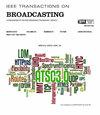为快速 HEVC 编码器选择基于学习的高效量化器
IF 3.2
1区 计算机科学
Q2 ENGINEERING, ELECTRICAL & ELECTRONIC
引用次数: 0
摘要
HEVC 中的速率失真优化量化(RDOQ)大大提高了传统均匀标量量化(SQ)的编码效率。由于 RDOQ 计算复杂,本文研究了一种在 HEVC 中更高效地执行 RDOQ 的方法。根据我们的统计观察,RDOQ 不会改变 SQ 量化结果的变换块(TB)所占的比例并不高,因此我们设计了一种基于学习的量化器选择方案,该方案可以提前判断 RDOQ 是否会修改 SQ 计算出的量化级别。只有那些可能会被 RDOQ 更改的 TB 才会进入实际的 RDOQ 流程。对于其余的 TB,我们设计了一种改进的 SQ,它能根据系数组和熵编码特征调整死区间隔大小和轮偏移。所提出的改进 SQ 比 RDOQ 的计算复杂度低得多,同时比传统 SQ 获得更好的编码效率。实验结果表明,我们的高效量化方案仅在 21% 的 TB 上选择性地执行 RDOQ,就分别减少了 9% 和 34% 的编码和量化时间。Y、Cb 和 Cr 信道的平均 BDBR 性能分别为-0.03%、0.48% 和 0.45%。本文章由计算机程序翻译,如有差异,请以英文原文为准。
Learning-Based Efficient Quantizer Selection for Fast HEVC Encoder
The rate-distortion optimized quantization (RDOQ) in HEVC has improved the coding efficiency of the conventional uniform scalar quantization (SQ) very much. Since the RDOQ is computationally complex, in this paper, we investigate a way of performing RDOQ more efficiently in HEVC. Based on our statistical observation of non-trivial percentage of transform blocks (TB) for which RDOQ does not change their quantization results of SQ, we design a learning-based quantizer selection scheme which can tell in advance whether RDOQ is expected to modify the quantization levels calculated by SQ. Only those TBs likely to be changed by RDOQ are subject to the actual RDOQ process. For the remaining TBs, we design an improved SQ which adapts the dead-zone interval size and round offset based on coefficient group and entropy coding features. The proposed improved SQ has much lower computational complexity than RDOQ while achieving better coding efficiency than the conventional SQ. The experimental results show that our efficient quantization scheme respectively provides 9% and 34% of encoding and quantization time reduction by selectively performing RDOQ only for 21% of TBs. The average BDBR performances of Y, Cb, and Cr channels are respectively–0.03%, 0.48%, and 0.45%.
求助全文
通过发布文献求助,成功后即可免费获取论文全文。
去求助
来源期刊

IEEE Transactions on Broadcasting
工程技术-电信学
CiteScore
9.40
自引率
31.10%
发文量
79
审稿时长
6-12 weeks
期刊介绍:
The Society’s Field of Interest is “Devices, equipment, techniques and systems related to broadcast technology, including the production, distribution, transmission, and propagation aspects.” In addition to this formal FOI statement, which is used to provide guidance to the Publications Committee in the selection of content, the AdCom has further resolved that “broadcast systems includes all aspects of transmission, propagation, and reception.”
 求助内容:
求助内容: 应助结果提醒方式:
应助结果提醒方式:


